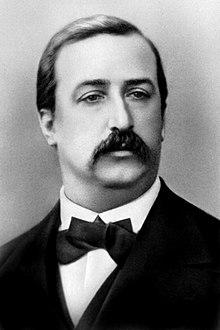Borodin
| Alexander Borodin | |
|---|---|
 |
|
| Born | 12 November 1833 Saint Petersburg, Russian Empire |
| Died | 27 February 1887 (age 53) Saint Petersburg, Russian Empire |
| Occupation | Composer and chemist |
Alexander Porfiryevich Borodin (Russian: Алекса́ндр Порфи́рьевич Бороди́н; IPA: [ɐlʲɪkˈsandr pɐrˈfʲi rʲjɪvʲɪtɕ bərɐˈdʲin], 12 November 1833 – 27 February 1887) was a Russian Romantic composer of Georgian origin, as well as a doctor and chemist. He was one of the prominent 19th century composers known as The Mighty Handful, a group dedicated to producing a uniquely Russian kind of classical music, rather than imitating earlier Western European models.
Borodin is best known for his symphonies, his two string quartets, In the Steppes of Central Asia and his opera Prince Igor. Music from Prince Igor and his string quartets was later adapted for the US musical Kismet. A notable advocate of women's rights, Borodin was a promoter of education in Russia and founded the School of Medicine for Women in St. Petersburg.
Borodin was born in Saint Petersburg as an illegitimate son of a 62-year-old Georgian nobleman, Luka Stepanovich Gedevanishvili, and a married 25-year-old Russian woman, Evdokia Konstantinovna Antonova. Due to the circumstances of Alexander's birth, the nobleman had him registered as the son of one of his Russian serfs, Porfiry Borodin, hence the composer's Russian last name. As a result of this registration, both Alexander and his nominal Russian father Porfiry were officially serfs of Alexander's biological father Luka. The Georgian father emancipated Alexander from serfdom when he was 7 and provided housing and money for him and his mother. In spite of this, Alexander was never publicly recognized by his mother, who stayed close but was referred to by young Borodin as his "aunt".
...
Wikipedia
